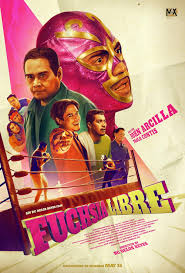
FUCHSIA LIBRE
Philippines, 2024, 112 minutes, Colour.
John Arcilla, Paolo Contis, Khalil Ramos.
Directed by RC Delos Reyes.
Best to check Filipino audiences and reviewers to gauge how this film communicates!
The screenwriters must have had lots of ideas for plot lines – and decided to include them all. Which means then that the film goes in all kinds of directions, gathering themes from a range of Filipino movies. Then the title eventually emerges.
The film opens nicely with father-son relationship, the little boy, his policeman father enthusiastically supporting him at boxing training, his moves. However, very unsubtly, we see the little boy attracted to another little boy and suspect instantly where this could lead. So, there is the exploration of the gay theme in Filipino society, the macho father and his disappointment in his son, the son coming out to his father and being rejected, and teaming up, running a gym, with a group of very, very camp friends.
One of the difficulties of this theme is that the writing and the performances would indicate that it is the work of straight writers and actors doing an impersonation of gay and camp, rather than coming across authentically. There are camp jokes. But, perhaps surprisingly or not, there is not an indication of any kind of intimate gay relationships or behaviour, just the camp and some cross-dressing.
So, we focus on the central character, seen as a boy, rejected by his father who bashes up a young man friend, witnessed by the police chief, and losing his possibilities for promotion, and as the film moves forward 10 years, working in car repairs.
The son is effective in his gym, training, enjoying his friends’ company, but then a twist in the plot as a landlord threatens to take over the building and the need money to buy the property.
The film then becomes a martial arts story, but especially in underground and illegal multi-martial arts fighting. Our hero then is persuaded to go into the fights to get the money to pay for the building, but wearing a mask, calling himself Fuchsia Libre, very camp in his behaviour and setting expectations, losing at first, but then winning.
The film then becomes a police undercover investigation, the hero’s father going undercover, becoming adviser to the psychotic young boss of the fights, criminal activities, drug deals, called The Patron. His outbursts and fanaticism and glee sadistic humour and, embarrassed, killing those he disapproves off, have to be seen to be believed. The father, not knowing that Fuchsia Libre is his son, decides to promote him as a fighter in order to further infiltrate the criminal gang, ultimately to get copies of financial dealings from his computer.
Which builds up of course to quite a climax, an opponent in a fight pulling off the mask, the father seeing his son, trying to warn him off fighting, the final desperate fight, the father supporting his son, the Patron going berserk, and an emotional fight and shootout.
And, as expected, father-son mutual reconciliation, forgiveness, love, and the father’s acceptance of his son as he is.
(The Filipino critics were not kind to Fuchsia Libre, too many themes are not always convincing.)